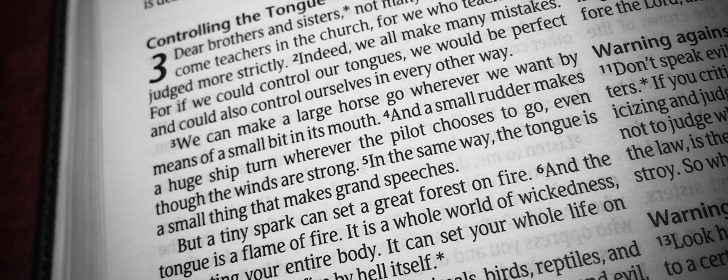
12 Apr Resources | Sins of the Tongue
“A whole world of wickedness” — that’s how James describes the tongue in his infamous section on our trouble with words. But what does that mean practically? For the Bible here to claim the tongue to be a whole world of wickedness, certainly it would also provide a laundry list of sins to back up that claim, right? Throughout the Scripture we actually do see a litany of diverse sins of the tongue bringing about unrighteousness in our lives in a myriad of ways:
• Gossip — unconstrained talk about others (typically marked by unconfirmed or untrue details)
• Slander — making false and damaging statements to smear someone’s character
• Scorning — harboring contempt (says they are worthless)
• Mocking — contempt-fueled belittling (typically incl. laughing at)
• Scoffing — to speak to someone about something in a scornful/mocking way
• Quarrelsome/contentious/argumentative — having a perpetually combative posture
• Strife — bitter disagreement/conflict
• Lying — saying or withholding something with the intent to deceive someone who has the right to know the truth
• Manipulation — influencing others in an exploiting, self-serving way
• Boasting — self-praise
• Cursing — to wish harm/injury upon someone
• Insulting/criticizing— to search for and magnify fault in others
• Insolence — showing haughtiness, lack of respect for others
• Foul/rotten/unwholesome/perverse speech — deliberately toxic
• Harshness — cruel and severe language
• Abusiveness — excessively and repeatedly cruel and severe language
• Grumbling/discontentment — always finding fault
• Promise-breaking — retracting/undercutting a once-given assurance
• Flattery — excessive, insincere praise
• Busybody/meddling — interfering with others’ affairs; treating what should be merely a concern as if it’s your responsibility
• Stirring up division — promoting disunity & hostility among people
Additionally, the Westminster Larger Catechism provides several points worthy of reflection on the issue of the tongue. It is important for us to see that as we examine our own words and the sinfulness and brokenness of our own hearts which they reflect, we recognize that there are not only sins to be avoided but also duties required for us to fulfill with the way we wield our words:
Q. 143. What is the ninth commandment?
A. The ninth commandment is You shall not bear false witness against your neighbor.
Q. 144. What are the duties required in the ninth commandment?
A: The duties required in the ninth commandment are that we protect and encourage truth between people, that we protect the good name of our neighbor as well as we protect our own. We are to actively demonstrate that we stand for truth. We must speak the truth and only the truth from the heart, sincerely, freely, clearly, in matters of judgment, justice and in all other things: We are to have a benevolent regard of our neighbors; loving, desiring, and rejoicing in their good name; sorrowing for, and caring for them in weaknesses and illnesses; freely acknowledging of their gifts and graces, defending their innocence. We should always be ready to hear a good opinion of our neighbors and be unwilling to receive a bad report about them. This we should discourage those who gossip and spread rumors, flatterers and slanderers. We should love and care of our own good reputation; and be prepared to defend it when necessary. We are to keep lawful promises. We are to think about and practice whatever things are true, honest, lovely, and of good report.
Q. 145. What are the sins forbidden in the ninth commandment?
A. The sins forbidden in the ninth commandment are that we must not distort the truth as it relates to the good name of anyone else in relation to ourselves. Especially in anything that involves a public judgment we must avoid giving false evidence, calling false witnesses, knowingly appearing on behalf of or supporting an evil cause. We must not defeat or hide the truth and so lead to unjust judgments. We are not to call evil good, and good evil. We are not to reward wickedness as though it were righteousness, nor cause righteous acts to be punished as if they were wicked. Any forgery, concealing the truth, undue silence in a just cause, and holding our peace when a wicked action requires either a reproof from ourselves, or complaint to others is forbidden. Anything that perverts the course of justice, that leads to a wrong judgment or a failure of justice is forbidden; even speaking the truth at the wrong time, or maliciously to achieve a wrong end, or perverting it to a wrong meaning, or any attempt to twist truth to imply something else is forbidden. Also forbidden are any untruth, lies, slanders, backbiting, personal denigration, tale bearing, whispering, mocking, reviling, thoughtless, harsh, and partial censuring; Any attempt to deliberately misunderstand another’s intentions, words, and actions is forbidden. This commandment forbids flattery, boasting and the thinking or speaking too highly – or too meanly – of ourselves or others. To deny the gifts and graces of God is sinful. To exaggerate smaller faults thus hiding, excusing, or extenuating of sins; to discover weaknesses unnecessarily these things are forbidden. The associated sins of raising false rumors, receiving and believing evil reports, refusing to listen to a just defense are forbidden. Harboring evil suspicions, envying or grieving at the deserved recognition of anyone, and then trying or desiring to damage it, or rejoicing in their disgrace and infamy is forbidden; as is scornful disrespect, breaking lawful promises and ignoring good things well spoken of. We must not practice things that give others a bad name and we must not do anything that encourages others to do such things nor must we hinder them when they are trying to avoid such things.


